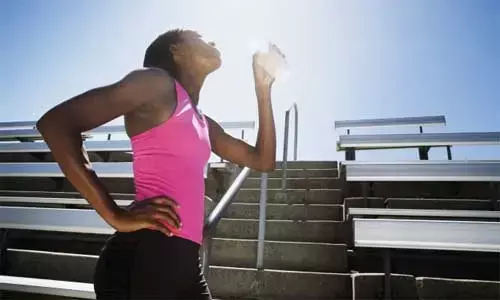- Home
- Medical news & Guidelines
- Anesthesiology
- Cardiology and CTVS
- Critical Care
- Dentistry
- Dermatology
- Diabetes and Endocrinology
- ENT
- Gastroenterology
- Medicine
- Nephrology
- Neurology
- Obstretics-Gynaecology
- Oncology
- Ophthalmology
- Orthopaedics
- Pediatrics-Neonatology
- Psychiatry
- Pulmonology
- Radiology
- Surgery
- Urology
- Laboratory Medicine
- Diet
- Nursing
- Paramedical
- Physiotherapy
- Health news
- Fact Check
- Bone Health Fact Check
- Brain Health Fact Check
- Cancer Related Fact Check
- Child Care Fact Check
- Dental and oral health fact check
- Diabetes and metabolic health fact check
- Diet and Nutrition Fact Check
- Eye and ENT Care Fact Check
- Fitness fact check
- Gut health fact check
- Heart health fact check
- Kidney health fact check
- Medical education fact check
- Men's health fact check
- Respiratory fact check
- Skin and hair care fact check
- Vaccine and Immunization fact check
- Women's health fact check
- AYUSH
- State News
- Andaman and Nicobar Islands
- Andhra Pradesh
- Arunachal Pradesh
- Assam
- Bihar
- Chandigarh
- Chattisgarh
- Dadra and Nagar Haveli
- Daman and Diu
- Delhi
- Goa
- Gujarat
- Haryana
- Himachal Pradesh
- Jammu & Kashmir
- Jharkhand
- Karnataka
- Kerala
- Ladakh
- Lakshadweep
- Madhya Pradesh
- Maharashtra
- Manipur
- Meghalaya
- Mizoram
- Nagaland
- Odisha
- Puducherry
- Punjab
- Rajasthan
- Sikkim
- Tamil Nadu
- Telangana
- Tripura
- Uttar Pradesh
- Uttrakhand
- West Bengal
- Medical Education
- Industry
Exercise-related hyponatremia: Updated WMS Guidelines

Philadelphia - The updated Exercise-associated hyponatremia clinical practice guidelines have been released by the Wilderness Medical Society. The guidelines stress that individuals engaged in physical and endurance activities should drink to satisfy their thirst (known as "drink to thirst") to avoid overhydration. The guidelines appear in Wilderness & Environmental Medicine.
Hyponatremia is a condition of low sodium concentration in the blood. Prolonged overhydration during exercise is the primary cause of all forms of exercise-associated hyponatremia (EAH) and should be avoided.
Appropriated management of EAH depends first on correctly diagnosing the condition. The guidelines address the assessment of patients with overlapping or nonspecific signs that can make differential diagnosis challenging, for example, with heat exhaustion or exertional heat stroke.
"Even after 40 years of worldwide documentation of EAH in both front country and backcountry physical activities there is still an ongoing need for education of the public, event directors, EMS personal, and clinicians for prevention strategies and medical management caused by overhydration of fluids that can result in rare, but life-threatening medical outcomes," explained lead author Brad L. Bennett, PhD, Adjunct Professor, Military & Emergency Medicine Department, F. Edward Hébert School of Medicine, Uniformed Services University of the Health Sciences, Bethesda, MD, USA. "The typical field response for heat-related illness or when someone is dehydrated is to encourage oral hypotonic fluid intake or administer rapid isotonic IV fluids to endurance activity participants. However, such universal treatment may result in increased morbidity and mortality in the EAH patient."
The guidelines recommend that:
- Appropriate education and coordination among participants, event directors, support crews, park rangers, first responders, and EMS transport personnel are essential in both prevention and management of EAH.
- Prolonged overhydration during exercise, which is the primary risk factor in the development of all forms of EAH, should be avoided.
- Sodium and/or salty snacks should be freely available for consumption along with the appropriate fluids, particularly in long, hot events in non-heat acclimatized persons.
- Participants should drink enough to satisfy their thirst but avoid overdrinking.
- Point-of-care testing should be done on at-risk, symptomatic patients, when available.
- Oral fluids should be restricted if EAH from fluid overload is associated with mild symptoms.
- Hypotonic fluids are contraindicated with suspected EAH.
- The use of oral salt or hypertonic fluids may be effective in reversing moderate to severe symptoms of EAH when no IV hypertonic saline (3 per cent) is available.
- Patients should be observed for at least 60 minutes after exercise to ensure no decompensation from delayed symptomatic EAH.
- Receiving caregivers should be alerted to the potential diagnosis of EAH and fluid management restrictions when transferring care.
"It is important to note that no single recommendation for fluid hydration will work in the range of physical activities in different humidity and ambient temperatures with varied sweat rate, body mass, exercise intensity, and duration. However, for the majority of individuals, drinking according to thirst can help prevent EAH and the potential for life-threatening outcomes," commented Dr Bennett.
EAH is generally defined as a sodium concentration of less than 135 mmol/L (135 mEq/L), with severe EAH being below 120 mEq/L. Symptoms may include nausea and vomiting, headache, short-term memory loss, confusion, and lethargy, altered mental status, coma, seizures, and/or respiratory distress, some of which can be confused with other medical conditions.
For more details click on the link: http://dx.doi.org/10.1016/j.wem.2019.11.003
Hina Zahid Joined Medical Dialogue in 2017 with a passion to work as a Reporter. She coordinates with various national and international journals and association and covers all the stories related to Medical guidelines, Medical Journals, rare medical surgeries as well as all the updates in the medical field. Email: editorial@medicaldialogues.in. Contact no. 011-43720751
Dr Kamal Kant Kohli-MBBS, DTCD- a chest specialist with more than 30 years of practice and a flair for writing clinical articles, Dr Kamal Kant Kohli joined Medical Dialogues as a Chief Editor of Medical News. Besides writing articles, as an editor, he proofreads and verifies all the medical content published on Medical Dialogues including those coming from journals, studies,medical conferences,guidelines etc. Email: drkohli@medicaldialogues.in. Contact no. 011-43720751


